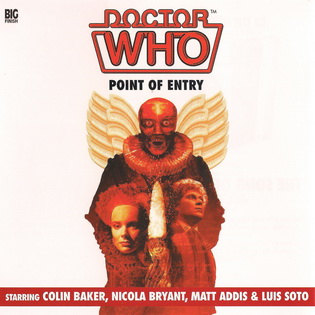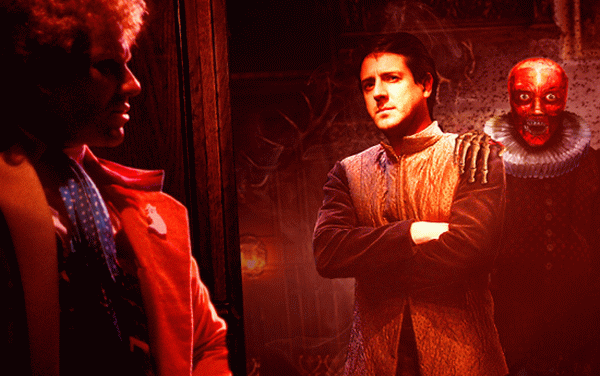|
| |
|
STORY PLACEMENT THIS STORY TAKES
PLACE BETWEEN
THE BIG "PARADISE 5" AND "THE SONG OF MEGAPTERA."
PRODUCTION CODE 6Y/A/F
WRITTEN BY MARC PLATT
BASED ON A STORY BY
DIRECTED BY JOHN AINSWORTH
RECOMMENDED PURCHASE BIG FINISH 'LOST STORIES' CD#1.6 (ISBN 1-84435-449-8) RELEASED IN APRIL 2010.
BLURB The 16th Century. Kit Marlowe is TRYING TO write Doctor Faustus when A darkness de- Scends on his life, in the cadaverous form of a Spaniard called Velez. The monstrosity is in search of a stone from South America...
After a near-FATAL collision with an asteroid in space, the TARDIS makes an emergency landing in Elizabethan England.
These two events are connected. The Omnim are ready. the point of entry approaches... |
|
|
Point of Entry APRIL 2010 (2 65-MINUTE EPISODES)
Prior to their release, I was already familiar with the first five Lost Stories. The Nightmare Fair and Mission to Magnus have been widely-known for many years thanks to Targetís novelisations of their aborted scripts, and much has been written about the likes of Leviathan, The Hollows of Time and Paradise 5 despite the extant scripts laying dormant until David Richardson set about compiling this remarkable run. Point of Entry, however, is entirely new to me. This shouldnít be all that surprising though, given that itís entirely new to just about everybody, including the man charged with writing its script: Marc Platt.
Expounded from a fruitless pitch that Enlightenment writer Barbara Clegg made to the production team in the 1980s, there is little to set this production apart from one that you might find in the main range. Free from awkward set pieces and overburdened dialogue, Point of Entry has a sheen to it that most of the preceding Lost Stories have lacked. Even Steve Foxonís beautiful sound design feels a little more modish than is usual for the range, the composer opting to score the period piece with apposite acoustic sounds, rather than the sort of intrusive, 1980s electro-bumph that Iíve come to expect from a Lost Story.
Nevertheless, Plattís script discernibly tries to mimic the tone of the foregoing Lost Stories, inflicting a measured pace and sense of restraint that is sufficient to convince the listener that this is a bona fide 1980s television soundtrack. On a few occasions, I expected Platt to push the envelope a little further, as no doubt he would have done were he writing a Ďregularí Doctor Who play, but to his credit the acclaimed Ghost Light scribe manages to balance his script on the sharpest of knife-edges.
to run with Cleggís synopsis. The 16th century setting, the Spanish necromancer, the magical stone blade plundered by the Conquist- adores, and the tortured playwr- ight are all elements that I could easily imagine Platt coming up with himself. What he does with them is most likely far darker than what Clegg would have done, but itís a testament to his deference for her original idea that when she read his script, she only had one amendment to suggest (though Colin Baker ultimately poo-pooed it!)
Kit Marlowe is captivatingly portrayed, the narrative focusing on his increasingly ungodly attempts to find inspiration for his Doctor Faustus. Our introduction to him inevitably calls the television seriesí Shakespeare Code to mind, but as matters progress the similarities become less and less evident. Point of Entry contains far less cheer than Gareth Robertsí vibrant tale did, and Matt Addisí sour Marlowe possesses none of the mischievous humour that made Dean Lennox Kellyís Shakie so loveable.
Above: Convincing mute Alex Mallinsonís cadaverous artwork
The playís real triumph though is Luis Sotoís Velez. An exiled Spaniard living in England, Velez is a sinister sorcerer whose very body is crumbling around him, Deadly Assassin Master-style. Soto, who is actually of Spanish lineage, gives a performance that becomes progressively more chilling as the titular point of entry approaches, buoyed all the way by the lingering image that convincing mute Alex Mallinsonís cadaverous artwork has burnt into the listenerís brain.
At this point in the season it goes without saying that Colin Baker and Nicola Bryant acquit themselves admirably; they always do. Even when surrounded by the dominating performa-nces of Addis and Soto, each leaves their mark on the listener, whether itís by way of their unconventional response to torture or their frightening inability to emulate Englandís most recognised queen regnant.
Dark and devilish, and bubbling with all the contemporaneous fervour of
Spanish Inquisitions and Aztec sacrifices, Point of Entry is no
doubt destined to become an unlikely favourite amongst the rangeís
listeners. Iím always a little wary of rejected scripts and unsuccessful
pitches, but I havenít been let down by Big Finish yet; only by the 1980s
production teams that saw fit to discard them.
|
|
|
Copyright © E.G. Wolverson 2010
E.G. Wolverson has asserted his right under the Copyright, Designs and Patents Act, 1988 to be identified as the author of this work. |
|
|
Unless otherwise stated, all images on this site are copyrighted to the BBC and are used solely for promotional purposes. ĎDoctor Whoí is copyright © by the BBC. No copyright infringement is intended. |
|

.jpg)

 And
Platt was certainly the man
And
Platt was certainly the man 